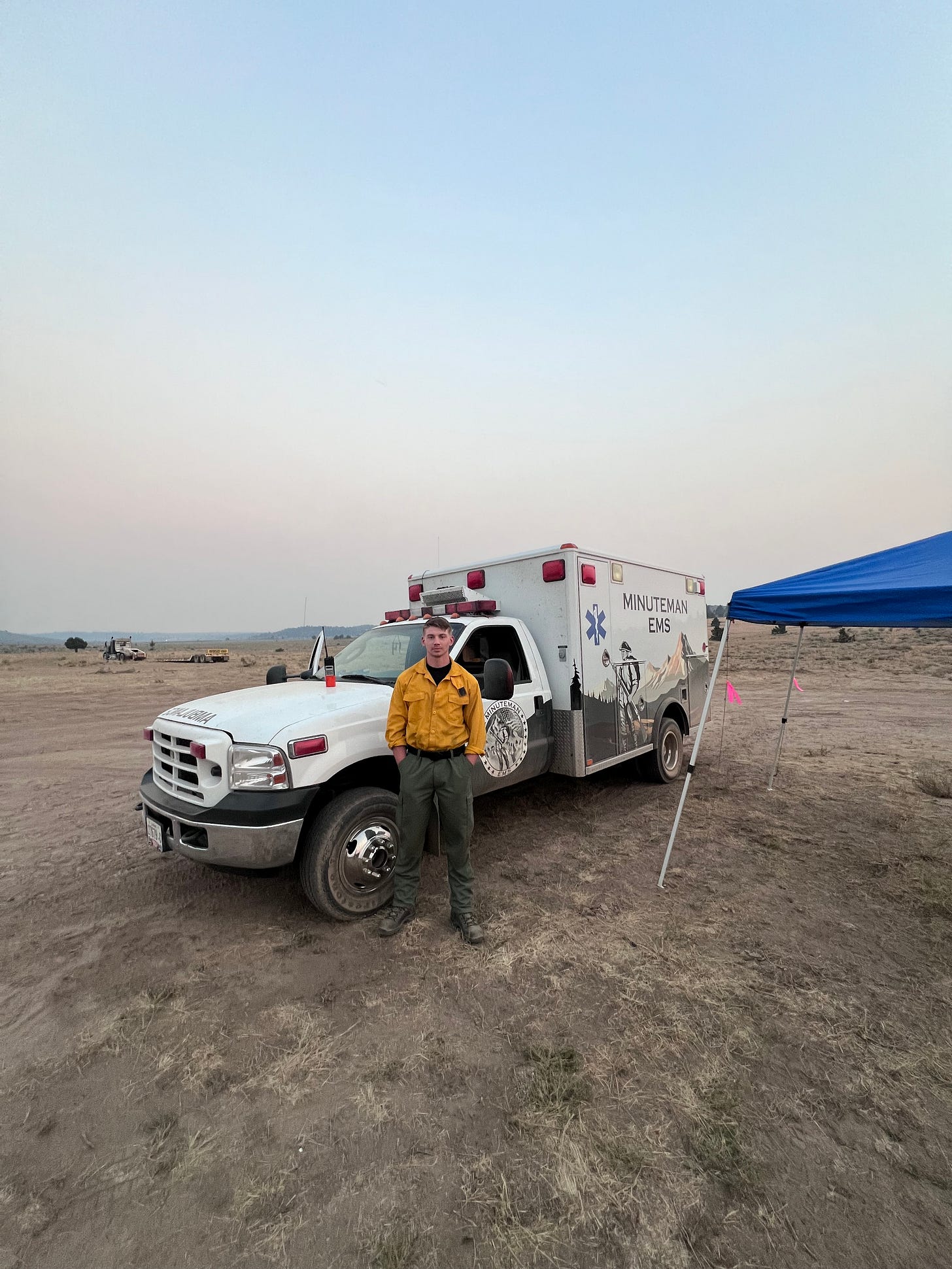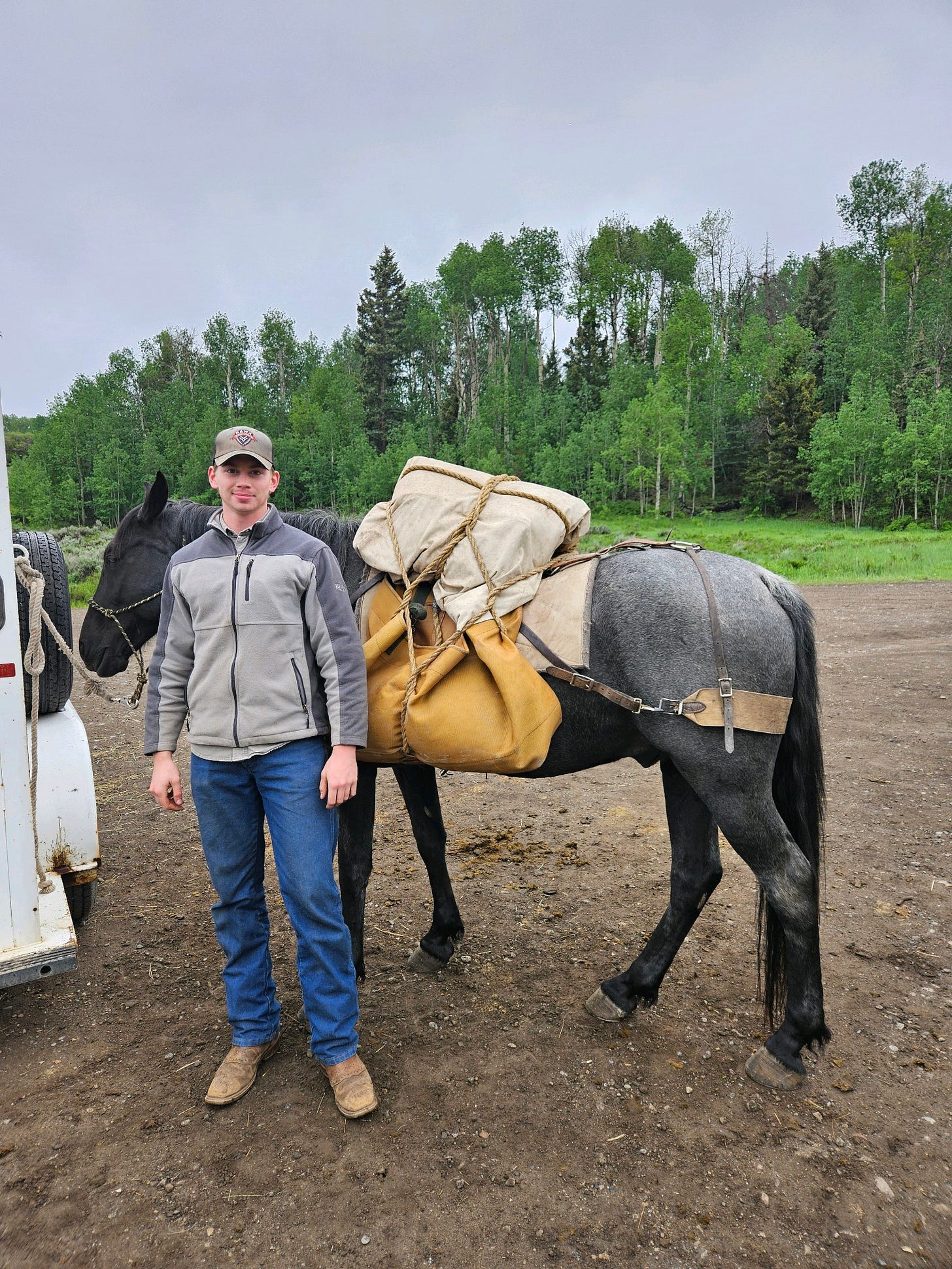11 Life Lessons...From a 20 Year Old
I sat down and took some time to think about it...these are the lessons I've learned in just 2 years that have changed everything for me...
Friday, November 21st, 2025
Writing to you from Uruguay
For the past two years I’ve been the beta tester for a program called The Preparation—an alternative to college, the military, and the trades. It’s a 4-year program with 16 “anchor” courses, each designed to give you foundational competency in a valuable skill.
At the end of the 4 years you’ll have a list of stories, life experiences, friends, credentials, and achievements so long that people won’t believe it when you tell them.
And, you’ll carry skills with you to be valuable wherever you go—meaning money-making will be easier for you than the job-dependent finance grad. You’ll become an “all terrain” type of person with endless amounts of opportunities at your fingertips.
Hard to believe?
I thought so too a couple years ago, but now I’m halfway through and reaping the rewards…
One of those rewards has been entirely intangible. Actually, this reward is more like a gift since most don’t get it until decades…many decades of their life have already passed. It’s not prestige, unwavering self-confidence, or adoration from great men…
It’s the life lessons garnered from the rapid introduction of new pursuits and real-world experience.
I’m 20 years old. After 2 years in The Preparation I’ve learned a lot. You’ll have to learn some of these life lessons through pure personal experience, but I can save you time and help you skip short-term suffering with this list. Here’s some of the greatest life lessons I’ve learned in the past two years:
I Know Nothing
Funny one to start off with…I know.
It seems odd, but this is probably one of the most important lessons anyone can learn in their entire life…and there’s a few reasons for that. Something that’s been on my mind recently is the incredible life of Socrates.
At one point the Oracle at Delphi—who delivered prophecies from the Temple of Apollo—declared Socrates was the wisest man. In order to disprove this, Socrates spoke to those who were thought wise in Athens, trying to prove their wisdom was greater than his.
His conclusion: He was the wisest.
Not because he knew more than others (as the other men claimed) but because he knew that he knew nothing in terms of all that could be known—he held himself with humility.
For that, he was the wisest man.
Thankfully my father introduced me to Socrates at a young age. This story stuck with me during the first few months of The Preparation when I was going through EMT school. As I was learning valuable skills, and being opened up to a range of knowledge, I realized that if I was only hitting the tip of the iceberg in this field then I truly know nothing in the context of all that can be known.
The benefits of this realization: An openness towards new ideas and skills, steadfastness in the face of criticism of personal abilities, an understanding that “the experts” aren’t what they seem to be…
In short: Humility, understanding, and a calm temperament in new situations.
Time and Energy
Day to day there are terrifying amounts of unused productive time in just about everyone’s life. Unless you’re a top performer there’s probably 4-6 hours thrown to the wind everyday.
The sooner you realize how little time you actually have (and how much time you waste) the better.
Back in August of 2023, when I started The Preparation, I jumped into learning a few new skills…adding 1 hour of chess practice, 1 hour of guitar practice, and occasionally 1 hour of Spanish practice. At the same time, I signed up for EMT school, started classes 8 days later, and began working at Office Depot to earn some money.
Even after all of that, I could still see that I had more time on my hands than I knew what to do with.
So, I started reading and taking classes at a local Brazilian Jiu-Jitsu (BJJ) gym. Within 25 days I went from wasting basically every hour of every day (yes, I was that lazy) to stacking my schedule with skills and work.
The intimate understanding of time aided me in making fast progress.
Also, you want to keep track of every productive thing you do in the day and how much time it takes. Measure how many of your waking hours are put to making progress. Is it 4 hours, 6, or 10? Be conscious of this number every day. Keep it in the back of your mind.
I bet you’ll be shocked at how much more time you can use in a day.
Oh and there’s this too…be selfish with your time. Create a schedule and a To-do list for each day of the week—stick to it.
Living in Extremes
Particularly one extreme: “The Grind.”
In many of the things I do, I usually view myself as completely in or 100% out. It’s one or the other. Now, this has been great for getting the train chugging along at high speed. Never in my life have I accomplished so much in such a short amount of time.
I’ve learned that there are times to put your nose to the grindstone—build the momentum and keep pushing no matter what. Find out how much you can get done in one day. Step way over the line of discomfort and see how long you can stand there.
You can do a whole lot more than you could possibly imagine.
If you know who you want to be, you can’t help but see the beauty in these moments of long, self-created difficulty.
The nose to the grindstone stuff has been fantastic for me. Though, sometimes I took it too far and burnt out. Funnily enough, you need to burn out a few times to figure out how far you can go. Take a day of rest when you need it, maybe a week, and get back to it when you’re re-energized.
You’ve got to learn how to balance staying on “The Grind” and maintaining enough energy to not burn out.
Don’t think that to make any personal progress you need to be like David Goggins or Jocko Willink. Discipline and routines are good—there’s a time and place for cold showers, long runs, and 2-hour workouts—but don’t let discipline become punishment. That life is a sterile life. Your energy and psychological state will take a big hit.
Last summer I went all-in with physical activities…training BJJ up to 5 times a week, lifting weights, and climbing multiple 14ers (14,000ft mountains).
Great views and great training?
Of course, no doubt about that. The huge downside was…I had very little energy to do anything else. Waking up at midnight to hike a mountain for 7 hours then getting up the next day to train BJJ and go to the gym left me exhausted. On top of getting a full night’s rest I’d have to take a 3-hour nap nearly every day. I hit my limit fast.
Take it too far a time or two—whether it’s study or physical training. But, beware not to drag out the suffering. Pull back to a sustainable (and energizing) level of forward movement.
This is how you build momentum.
Reflection
It’s all a balancing act.
If you keep your head down working too much you won’t take the time to reflect on what you’ve done, what you can do, and who you are. On the flip side, if you reflect all the time you won’t put your head down and get to work.
It’s a tricky thing, but man, there’s nothing like directing your own life. Every stumble, every fall, it all gives you an opportunity to learn, to progress, to overcome.
Taking time to reflect is incredibly valuable. People love pipes and cigars for this reason: it forces them to slow down and think. Of course, I’m not saying you need to buy a box of cubans to use your brain, but having a “reflection ritual” is a good thing.
This is what I recommend you do to reflect or aid in reflection:
Have a list of things you want to get done everyday
Document every minor and major accomplishment
Set an obtainable objective every day
Constantly reflect on what you’re doing to figure out what you can do better
Write down your thoughts of the day: What did you achieve? What did you overcome? What could you have done better?
When you’re discouraged take a look at your list of accomplishments…how far have you come?
You need to reflect in order to understand what you can do better. Sometimes you need reflection for motivation. Now, 2 years into this, I can open up a drawer full of old notebooks and written accomplishments. Seeing what I’ve already managed to achieve is a huge motivator.
“I’m not interested…”
It would be hard to count the number of times I use to say some version of, “I’m not interested in…” when someone suggested I learn or do something. Anytime something was outside my tiny range of interest I would immediately shoot it down.
EMT school brought the first major blow to this thinking that eventually would be killed off by barrage of other skills that I assumed wouldn’t be interesting to me (sailing, flying, rope skills, etc.)...
A few weeks into taking classes I loved what I was learning. I was interested.
Being closed-minded is repulsive to the better (and certainly the best) version of yourself. Assuming that you’re not interested in something you’ve never tried is you essentially saying that you know all there is to know about the thing...and you’re sure it’s not for you.
You don’t. You won’t have any clue until you try it.
The great majority of my accomplishments in the last two years have come about by doing new things—lots of them—even if I wasn’t originally interested in them.
Then, as I dove into new things I started to think, “You know what? This is interesting.”
Interest comes with understanding. It comes with unlocking areas of knowledge that were entirely unknown to you in the beginning. It isn’t until after you dive head-first into most things that the interest emerges.
Think of it like a video game. Whenever you explore a new geographical location you unlock a new area of the map—allowing you to see the details of events in the area and more easily travel back to the location in the future. It’s the same as learning, physically doing work that’s new to you, and traveling to new places in real life (in the way that it gives you a new perspective of the world)…
When trying to make progress in life (especially when trying to make rapid progress within The Preparation) don’t “Ex-out” the things that seem uninteresting to you.
Focusing only on what you assume will be interesting to you might work for a while, but eventually you’ll end up as one of those people who only pursues their passions…which is BS. Meaning (at least in the sense of the Hero’s Journey) is found in uncertainty, the unknown, and the pursuit of becoming better through it.
Scared? Good.
“Where your fear is, there is your task.”
-Carl Jung
September, 2023: I was sitting in my car. My palms were clammy, my chest tight, and my heart was beating so hard you could hear it if you sat next to me. The thought of walking through that door, knowing that I was going to look like an idiot, freaked me out. It didn’t matter. The clock was ticking and it was time for me to head inside. I got out of the car and as I was walking to the door my vision seemed blurry. Grabbing the door handle, my heart felt like it started beating even harder than before, but I pulled the door open and walked inside. The Brazilian Jiu-Jitsu class was about to start.
I suppose that being a natural introvert and previously having severe social anxiety has brought up the sheer volume of fear in my life, but I have no doubt that fear has played you like a fiddle…
As humans, we naturally revert back to doing as little as possible. Feeding enough coal to keep the train inching along, but not enough to really get us anywhere. It’s about saving energy. Well, do you remember one of the key lessons from Time and Energy? You don’t have much time. Saving energy isn’t the main priority.
But, aside from natural laziness, the main inhibitor to getting everything you want in life is fear. Fear stops us from meeting the people we should meet, learning what we should learn, doing what we should do, going where we should go…
Don’t listen to it.
Everything I’ve done in the past two years has made me fearful—EMT school, learning to sail in the Falklands, flight training, wildfire work, ranch work—you name it.
I’d recommend reading the Managing Your Mind chapter of The Preparation to learn how to manage fear.
But, if there’s one thing for certain it’s that every time I felt fear about doing something that I know would probably be good for me to do, I’ve walked away with fantastic stories, friends, money, and new skills. There are different kinds of fear (and you need to pay attention to which types present themselves, and when) but the type of fear based in fear of criticism is always going to limit your growth if you let it.
Fear is a major topic…I have 2 other essays on it HERE and HERE.
Anyway, I’ll leave you with this and a great quote: Fear points the way to where you should be going. When you feel fear think, “Good, I have an opportunity to make progress.”
“I must not fear. Fear is the mind-killer. Fear is the little-death that brings total obliteration. I will face my fear. I will permit it to pass over me and through me. And when it has gone past I will turn the inner eye to see its path. Where the fear has gone there will be nothing. Only I will remain.”
―Frank Herbert
The 3 P’s and the 6 P’s
It’s helpful to have a few adages in your back pocket. They express general truths in a short sentence. They should be repeated enough to be relayed on the drop of a hat. Hammer them into your mind.
The 3 P’s: Persistence Permits Progress
The 6 P’s: Proper Preparation Prevents Piss Poor Performance
I came up with the first one (at least I think I did) and I like the two of these together because they work well in tandem.
Anyway…
The last two years have been great, but they could have been even better with proper planning and, funnily enough, with more preparation. I’ve learned that good things require planning—usually months in advance. If I had planned ahead more often I could have accomplished even more than I did. Spontaneity is good, but careful planning is where a lot of great things happen.
But, Persistence Permits Progress comes in afterward. That’s when you follow through and stick to the plan. Easier said than done sometimes…
People Will Come to Your Aid
Six months ago I was hiking with my uncle in Colorado. He’s a great guy and someone who’s very easy to talk to. There aren’t many people in the world as genuine as he is. On that hike I asked him a question, “What are some of the greatest lessons you’ve learned in your life thus far?”
He had plenty of good answers, but one of the best was related to making progress in life and just how easy it is to get ahead, especially if you’re young.
Here’s a paraphrased version of what he said: accept and admit ignorance, be proactive, be intentional, put forth huge amounts of work, ask for help from “wise elders”, and always be eager to reciprocate.
If you do these things unique opportunities will come your way.
Well, in the last two years I’ve done an alright job of doing this—leading to over 10 unique opportunities. Here’s just a few of them:
I got a recommendation from Matt Bracken (Navy Seal, sailor, author) to take a competent crew sailing course, which I took a few months later and sailed in the Falklands and through the Strait of Magellan
Tyler Olson (Founder of Minuteman EMS, Minuteman Marketing, The Journeyman; Entrepreneur, paramedic, outdoorsman, ex military man) offered that I work on his wildland EMS crew as an EMT. I took him up on it and stayed on fires for a total of 41 days (earning $600/day) in 2024.
A very impressive man found my Substack page and offered that I visit him at his ranch in Colorado to learn the basics of packing. I stayed for a few days and learned the basics. Since then we’ve had a great relationship.
All of this came about from putting forth a consistent amount of effort and broadcasting it to a public audience on Substack. Unknown to me originally, this would provide a great “proof of work” for impressive people to view. As Michael Yon told me recently, “It’s not how many people read your work, but who.”
The thing about impressive, highly-accomplished people is that they tend to be sincerely good individuals. As they grow older they want to see young people succeed and they are more than willing to stick their neck out for you. If you consistently do good work, provide proof of work, and get the word out about what you’re doing (in a clear, humble, and bearable way) then more opportunities will come your way than you know what to do with.
You’ve Gotta Look Like a Fool…
Piggybacking off of the I Know Nothing section…you have to realize just how important it is to be willing to look like a fool. Frankly, it’s unavoidable in life. Anything new that you try to do is going to result in you looking (and definitely feeling) like an idiot.
Again, time in finite, if you’re doing something you know you should be doing then you’re spending what little time you have wisely. Knowing that, looking like a fool, fearing the criticism of others, is not something that should worry you.
Reading Plato, Aristotle, Marcus Aurelius, and Epictetus will help you in learning this lesson just as it’s helped me.
But, to really learn this lesson fast and understand how important it is, you have to get real-world experience. Learn as many new things as possible within a short period of time and you’ll begin to see that the “Looking like a fool” phase of the learning process is just that—a part of the process.
Master your negative emotions around criticism and you’ll go far…
Sidestepping Authority
I think we’ve seen how trusting “the experts” can be a manipulation to bring great evil…
I am happy to see that the trust in “the experts” has only gone down since the (social, psychological, cultural, political…) cataclysm of covid. But, there’s still a long way to go…
There’s been three examples that I can think of in the last two years where I’ve seen my image of skilled people get a reality check…
While working on wildfires I noticed something interesting…every paramedic and every EMT had a slightly different way of doing things. Sure, there was a standard set in common medical knowledge, but everyone had a unique way of operating. Along with that, I was sitting with a paramedic and asking him about his career when he told me something that shocked me, “I’ve killed a lot of people.”
I asked him to clarify—hoping that I wasn’t sitting next to a maniac. He said, “I mean that I’ve made lots of mistakes that got people killed. You try to do what you think is best, but sometimes you get it wrong and people die.”
Here are two more examples of what I’m trying to get at: Every flight instructor I’ve had (around 6 in total) has a slightly different way of doing things…yet they were all sure that their way was the best. And, while sailing in the Falklands, I saw they even long-time sailors can forget a thing or two.
This is all to say that even the experts frequently do the wrong thing. Even the master has much to learn.
What to do with this lesson?
Implant it in your mind. It’ll keep you from kneeling to so-called “authority” and holding them above you for their credentials or position. Admire experience and draw value from it, but realize that behind the label of doctor, pilot, president, or CEO is just another human.
With this in mind you can do more good, valuable, and productive things by sidestepping authority (carefully) when necessary.
This is a topic that still requires its own undivided attention. It’s best saved for another time, but I’m excited to lay it out for you…
The Only Thing That Really Matters
Much of the credit for this goes to my father. Two monumental events occurred in his life when he was 30—one event was terrible, the other wholesome.
These events led him to one of the ancient stoics: Epictetus. He read the work of Epictetus over and over again. It was exactly what he needed. It reoriented him and reframed the way he looked at the world.
Virtue, radical personal responsibility, and self-control became some of the major motivating factors of his life…
As my sister and I were growing up he would speak of the stoics and virtues in a subtle way. It became normal for us to hear names like Epictetus or Marcus Aurelius and to hear words like Courage. It wasn’t all talk though, our dad’s actions certainly reflected what he was (unknown to us) trying to teach us. Over time, I began to read some of the works of the ancient stoics. Words like virtue and morality came up again and again.
Anyway…
It’s become clear to me that the best life is the virtuous life. There are no “ifs, buts, or maybes” to this. This is not subjective, it’s objectively true. You can throw everything out the window: skills, achievements, financial success, romantic success. A life without virtue is empty. Virtue aims to something higher…something unexplainably good.
Virtue makes the man.
-Maxim Benjamin Smith








